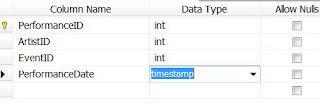How to list all tables and each table, loop through each column using SQL query
It is not uncommon to get the list of all column names from all available tables; at times some valuable information peeps out when one researches it. The following query will get you exactly that
select sys.syscolumns.name as ColumnName, sys.sysobjects.name as TableName from sys.syscolumns,sys.sysobjects where sys.sysobjects.id = sys.syscolumns.id
Monday, September 5, 2011
Friday, June 3, 2011
How to Split SQL String to Multiple String using Delimiter
How to check if a text exists within another in SQL Server 2008 / How to split SQL Column based on Comma
You can use the combination of CharIndex and Substring function in SQL to split the string based on delimiter.
Here is a way to split a column based on Comma
Select LTRIM(SUBSTRING(EmpAddress, CHARINDEX( ',',EmpAddress)+1,len(EmpAddress))) from #TempEmployee
We have used Ltrim to remove any leading spaces
You can use the combination of CharIndex and Substring function in SQL to split the string based on delimiter.
Here is a way to split a column based on Comma
Select LTRIM(SUBSTRING(EmpAddress, CHARINDEX( ',',EmpAddress)+1,len(EmpAddress))) from #TempEmployee
We have used Ltrim to remove any leading spaces
Tuesday, May 31, 2011
A RETURN statement with a return value cannot be used in this context. - Create Function
If this error occurs in the Create Function that uses a table then the variable after return statement should be removed
The syntax should be like
Create Function
Returns Table
(
Table Definition here
..
..
)
as
BEGIN
..
..
RETURN -- note no value is returned here
END
The syntax should be like
Create Function
Returns
(
Table Definition here
..
..
)
as
BEGIN
..
..
RETURN -- note no value is returned here
END
How to get the list of Functions in Database
How to Filter Functions from Sys.Objects
The following query will list of the Functions that are part of the database:
SELECT * FROM
sys.objects
where type in ('FN', 'IF', 'TF')
The following query will list of the Functions that are part of the database:
SELECT * FROM
sys.objects
where type in ('FN', 'IF', 'TF')
Monday, February 21, 2011
Cannot alter column 'X' because it is 'timestamp'.
How to Change DataType of TimeStamp Column.
Datatype of Timestamp column cannot be deleted. Hence it is advised to drop the column and re-create it
For example,
ALTER TABLE [dbo].[PerformanceMaster] DROP COLUMN PerformanceDate
ALTER TABLE [dbo].[PerformanceMaster] ADD PerformanceDate datetime2
Datatype of Timestamp column cannot be deleted. Hence it is advised to drop the column and re-create it
For example,
ALTER TABLE [dbo].[PerformanceMaster] DROP COLUMN PerformanceDate
ALTER TABLE [dbo].[PerformanceMaster] ADD PerformanceDate datetime2
Cannot insert an explicit value into a timestamp column. Use INSERT with a column list to exclude the timestamp column, or insert a DEFAULT into the timestamp column.
TimeStamp Column in SQL Server
TimeStamp is used to store unique binary numbers within a database. This column is autogenerated with a storage size of 8 bytes.
IF you want to store the Date and Time (e.g., updated time etc) use datetime2 datatype instead of timestamp.
The error "Cannot insert an explicit value into a timestamp column. Use INSERT with a column list to exclude the timestamp column, or insert a DEFAULT into the timestamp column." occurs when you try to insert the value using Insert statement. Leaving the column in the Insert will automatically update the value
Insert into PerformanceMaster (PerformanceID, EventID, ArtistID, PerformanceDate )
values (@PerformanceID, @EventID, @ArtistID, @UpdateDate )
Should throw and error. Use the following instead:
Insert into PerformanceMaster (PerformanceID, EventID, ArtistID, )
values (@PerformanceID, @EventID, @ArtistID)
TimeStamp is used to store unique binary numbers within a database. This column is autogenerated with a storage size of 8 bytes.
 |
| SQL Server - TimeStamp Column |
IF you want to store the Date and Time (e.g., updated time etc) use datetime2 datatype instead of timestamp.
 |
| SQL Server DateTime Column to Record Date and Time |
The error "Cannot insert an explicit value into a timestamp column. Use INSERT with a column list to exclude the timestamp column, or insert a DEFAULT into the timestamp column." occurs when you try to insert the value using Insert statement. Leaving the column in the Insert will automatically update the value
Insert into PerformanceMaster (PerformanceID, EventID, ArtistID, PerformanceDate )
values (@PerformanceID, @EventID, @ArtistID, @UpdateDate )
Should throw and error. Use the following instead:
Insert into PerformanceMaster (PerformanceID, EventID, ArtistID, )
values (@PerformanceID, @EventID, @ArtistID)
Friday, January 14, 2011
Information_Schema.Routines doesn't return all procedure names
How to get a list of Procedures containing Specific Text / How to get a list of Procedures using Particular Table
Here is one method we generally use for returning Stored Procedures containing a particular text
SELECT ROUTINE_NAME
FROM INFORMATION_SCHEMA.ROUTINES
WHERE ROUTINE_DEFINITION LIKE '%used_by_id%'
AND ROUTINE_TYPE = 'PROCEDURE'
order by ROUTINE_NAME
However, we found it has some problems when the text appears at the fag end of big procedures. Instead try the following also and match the result
SELECT OBJECT_NAME(id)
FROM syscomments
WHERE [text] LIKE '%used_by_id%'
AND OBJECTPROPERTY(id, 'IsProcedure') = 1
GROUP BY OBJECT_NAME(id)
SELECT Name
FROM sys.procedures
WHERE OBJECT_DEFINITION(object_id) LIKE '%used_by_id%'
order by name
SELECT OBJECT_NAME(object_id)
FROM sys.sql_modules
WHERE Definition LIKE '%used_by_id%'
AND OBJECTPROPERTY(object_id, 'IsProcedure') = 1
order by OBJECT_NAME(object_id)
Here is one method we generally use for returning Stored Procedures containing a particular text
SELECT ROUTINE_NAME
FROM INFORMATION_SCHEMA.ROUTINES
WHERE ROUTINE_DEFINITION LIKE '%used_by_id%'
AND ROUTINE_TYPE = 'PROCEDURE'
order by ROUTINE_NAME
However, we found it has some problems when the text appears at the fag end of big procedures. Instead try the following also and match the result
SELECT OBJECT_NAME(id)
FROM syscomments
WHERE [text] LIKE '%used_by_id%'
AND OBJECTPROPERTY(id, 'IsProcedure') = 1
GROUP BY OBJECT_NAME(id)
SELECT Name
FROM sys.procedures
WHERE OBJECT_DEFINITION(object_id) LIKE '%used_by_id%'
order by name
SELECT OBJECT_NAME(object_id)
FROM sys.sql_modules
WHERE Definition LIKE '%used_by_id%'
AND OBJECTPROPERTY(object_id, 'IsProcedure') = 1
order by OBJECT_NAME(object_id)
Subscribe to:
Comments (Atom)

